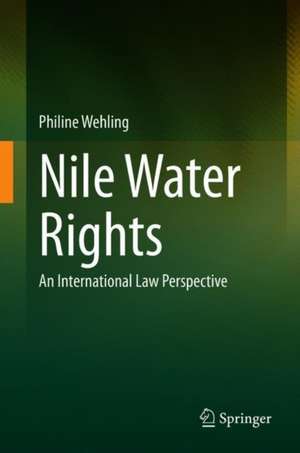Nile Water Rights: An International Law Perspective
Autor Philine Wehlingen Limba Engleză Hardback – 26 iun 2020
| Toate formatele și edițiile | Preț | Express |
|---|---|---|
| Paperback (1) | 642.36 lei 6-8 săpt. | |
| Springer Berlin, Heidelberg – 26 iun 2021 | 642.36 lei 6-8 săpt. | |
| Hardback (1) | 575.26 lei 38-44 zile | |
| Springer Berlin, Heidelberg – 26 iun 2020 | 575.26 lei 38-44 zile |
Preț: 575.26 lei
Preț vechi: 719.08 lei
-20% Nou
Puncte Express: 863
Preț estimativ în valută:
110.09€ • 119.54$ • 92.47£
110.09€ • 119.54$ • 92.47£
Carte tipărită la comandă
Livrare economică 18-24 aprilie
Preluare comenzi: 021 569.72.76
Specificații
ISBN-13: 9783662607954
ISBN-10: 3662607956
Pagini: 319
Ilustrații: XVI, 319 p. 1 illus.
Dimensiuni: 155 x 235 mm
Ediția:1st ed. 2020
Editura: Springer Berlin, Heidelberg
Colecția Springer
Locul publicării:Berlin, Heidelberg, Germany
ISBN-10: 3662607956
Pagini: 319
Ilustrații: XVI, 319 p. 1 illus.
Dimensiuni: 155 x 235 mm
Ediția:1st ed. 2020
Editura: Springer Berlin, Heidelberg
Colecția Springer
Locul publicării:Berlin, Heidelberg, Germany
Cuprins
Introduction.- Part I: International Water Law.- Development of International Water Law.- Customary Principles of International Water Law.- International Agreements on Transboundary Freshwater Resources.- Part II.-The Nile.- The Nile and its Catchment Area.- The Treaty Regime for the Nile.- Regional Cooperation Initiatives.- Agreement on the Nile River Basin Cooperative Framework.- Implementing the Principle of Equitable and Reasonable Utilization in the Nile Basin.- Part III.- Summary and Outlook.- Toward a Legal and Institutional Framework for Cooperation along the Nile.
Notă biografică
Philine Wehling is a Legal Officer at the International Institute for the Unification of Private Law (UNIDROIT) in Rome. Previously, she worked as a Legal Specialist at the Legal Office of the United Nations Food and Agriculture Organization (FAO) in Rome, providing legal advice and legislative assistance to governments on freshwater resources and agriculture. She further served as a Legal Advisor at the German Federal Ministry of Justice and Consumer Protection in Berlin. Wehling received her doctoral degree in law from the University of Heidelberg. Her doctoral dissertation on international water law was published in the Max-Planck-Institute for Comparative Public Law and International Law Series and received the Margot-und-Friedrich-Becke Prize in 2018.
Textul de pe ultima copertă
The book provides a comprehensive assessment of the law governing the use and management of the Nile and considers, more broadly, how international water law can guide the development of a legal and institutional framework for cooperation over shared freshwater resources. It defines the current state of international water law and discusses the content of the United Nations Convention on the Law of the Non-Navigational Uses of International Watercourses. On this basis, it assesses the Nile water treaties and the 2010 Cooperative Framework Agreement for the Nile, and examines their compliance with international law, with a specific focus on the legal consequences of South Sudan's secession from Sudan. Moreover, the book recommends important amendments to the 2010 Agreement. Building on these recommendations, it addresses the implementation of the principle of equitable and reasonable use regarding the Nile, illustrating the extent to which the principle can provide a conceptual framework for regulating water use. The book is a valuable resource for academics and practitioners alike as it combines legal assessment with a discussion of how international water law principles can be implemented in practice.
“Essential reading for anyone interested in understanding international law related to the Nile River basin, including its evolution, current challenges and future prospects.” - Professor Alistair Rieu-Clarke, Chair in Law, Law School, Northumbria University, Newcastle
“A true must-read for anyone interested in the developing Nile River legal and institutional regime and in how to implement international water law principles and guidance at the transboundary river basin level. Most notably, the book operationalizes the principle of equitable use and applies it to the Nile, pointing the way forward for the cooperative management of the river’s resources.” - Stefano Burchi, Chairman of the Executive Council, International Association for Water Law (AIDA)
“A true must-read for anyone interested in the developing Nile River legal and institutional regime and in how to implement international water law principles and guidance at the transboundary river basin level. Most notably, the book operationalizes the principle of equitable use and applies it to the Nile, pointing the way forward for the cooperative management of the river’s resources.” - Stefano Burchi, Chairman of the Executive Council, International Association for Water Law (AIDA)
Caracteristici
Comprehensive legal assessment of existing treaty law on the Nile Analysis of the 2010 Cooperative Framework Agreement for the Nile with recommendations for amendment Significant contribution to the concretization of the principle of equitable and reasonable utilization, through its application to the Nile Review and weighing of factors and circumstances relevant for determining equitable and reasonable utilization of the Nile Update on the current state of international water law, valuable for academics and practitioners alike
